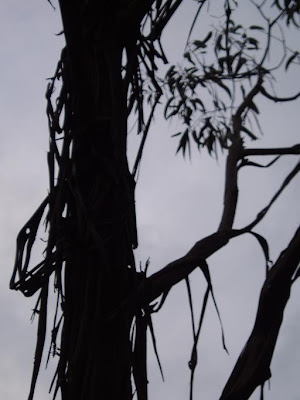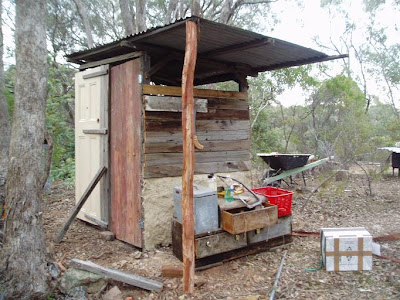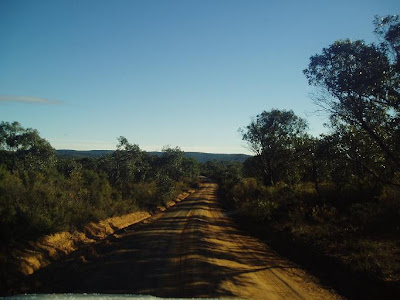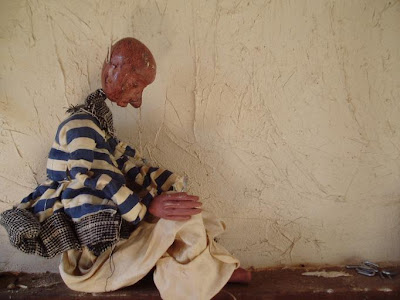Benoit/Claire
PO Box 221
3451 Chewton,
Victoria,
Australie.
Saturday, June 21, 2008
Friday, June 20, 2008
17 june 2008
the small talking birds bring in the light. we try sleeping with our heads up the other end of the bed, leaving our toes with the inevitable draft that comes through our muded-up windows. I wake to pee in the black compost bucket and see the moon sitting just above the most distant trees, a hole-punch of orange in the otherwise dark world. it’ll be another day without rain. but our small tank is full, and we’ve the dam down in the dip of land. a big brown puddle one-quarter full. the two stone steps that once brought you into the water now lead you across a few metres of mud beforehand. benoit’s built another step, but we’ll need more if they’re to reach the water again.
we live in a small house. and it’s winter. not the same kind of winter that we had a few months ago. not a winter where the blue skies mean it’s minus zero. this is a southern hemisphere winter, an Australian winter, a rural Victorian winter.
we live on a small pocket of land that slopes down into gullies which run into the towns. there’s no frost up here. the earth is rocky and dry. a millimetre of topsoil form the build up of eucalypt leaves. the trees are spindly like young girls. they offer little shade. there’s not much of an understory. just the rocks that have been collected by someone before and thrown into piles or into small dividing walls. or lie otherwise untouched for who knows how long. when we pick them up we’re careful of the scorpions which are hibernating beneath. we’ve found the old vegie garden of a previous inhabitant and we’ve dug it up and fed it with manure and mushroom compost. we’ll wait until the spring to plant it out. in the meantime, for the winter greens, we’ve made a small circle garden closer to the house. we’ll see if the roots of roquette and minoza can compete with those of the eucalypts.
many people have lived in this house before. I think we’ll be the first to live here with a baby. it’s probably the perfect size for one simple person. there’s no space to collect things. we fold up the bed each day into this couch which I’m sitting on. our blankets collected into a basket which waits in the corner until evening, when we’ll unfold everything out again. we have a small table for breakfast and everything else. a camping stove, a pot belly, a 30 litre jerry can full of drinking water and two chairs. there’s no bathroom yet. there’s no toilet. there’s the strawberries and thyme, sage, mint and rosemary we’ve planted outside the door. and the big fire pit where we burn the old palates that have been left lying around. there’s the clearing where we park our car, and the chicken house we’re building for the 6 isa brown hens we’ll get and the australorpe rooster.
there’s the bush with the invisible boundaries that tell you who owns the land. but we ignore this detail and walk anywhere, believing that we may have a small house but we’ve the biggest garden you can find.
I don’t know how long we’ll be here. long enough to make it more beautiful. long enough probably for it to be hard to ever leave.
our last house was made of stone, and is some 20 000 kilometres away. we lived there for just one year. we dug up the earth and milked the goats and got married there. I tried to learn French there. the garlic and the broad beans we planted before we left have just been harvested by benoit’s family who recently visited and kept expecting us to appear, chasing the ducks out of the garden or leading the goats.
now we live in this house made of wood. there’ll never be any fences to allow us to keep milking goats. and the presence of dams spotted every few hundred metres means we can never get ducks. they’ll turn the stagnant water thick like stew with all their grime and cleaning. instead we’ll have the baby, and the sun and the spindly trees. we’ll have the easy language I know so well and rainwater and all the birds that wildcats haven’t killed. we’ll have the rocks and the clay and the free firewood and the horizon which we can see.
we live in a small house. and it’s winter. not the same kind of winter that we had a few months ago. not a winter where the blue skies mean it’s minus zero. this is a southern hemisphere winter, an Australian winter, a rural Victorian winter.
we live on a small pocket of land that slopes down into gullies which run into the towns. there’s no frost up here. the earth is rocky and dry. a millimetre of topsoil form the build up of eucalypt leaves. the trees are spindly like young girls. they offer little shade. there’s not much of an understory. just the rocks that have been collected by someone before and thrown into piles or into small dividing walls. or lie otherwise untouched for who knows how long. when we pick them up we’re careful of the scorpions which are hibernating beneath. we’ve found the old vegie garden of a previous inhabitant and we’ve dug it up and fed it with manure and mushroom compost. we’ll wait until the spring to plant it out. in the meantime, for the winter greens, we’ve made a small circle garden closer to the house. we’ll see if the roots of roquette and minoza can compete with those of the eucalypts.
many people have lived in this house before. I think we’ll be the first to live here with a baby. it’s probably the perfect size for one simple person. there’s no space to collect things. we fold up the bed each day into this couch which I’m sitting on. our blankets collected into a basket which waits in the corner until evening, when we’ll unfold everything out again. we have a small table for breakfast and everything else. a camping stove, a pot belly, a 30 litre jerry can full of drinking water and two chairs. there’s no bathroom yet. there’s no toilet. there’s the strawberries and thyme, sage, mint and rosemary we’ve planted outside the door. and the big fire pit where we burn the old palates that have been left lying around. there’s the clearing where we park our car, and the chicken house we’re building for the 6 isa brown hens we’ll get and the australorpe rooster.
there’s the bush with the invisible boundaries that tell you who owns the land. but we ignore this detail and walk anywhere, believing that we may have a small house but we’ve the biggest garden you can find.
I don’t know how long we’ll be here. long enough to make it more beautiful. long enough probably for it to be hard to ever leave.
our last house was made of stone, and is some 20 000 kilometres away. we lived there for just one year. we dug up the earth and milked the goats and got married there. I tried to learn French there. the garlic and the broad beans we planted before we left have just been harvested by benoit’s family who recently visited and kept expecting us to appear, chasing the ducks out of the garden or leading the goats.
now we live in this house made of wood. there’ll never be any fences to allow us to keep milking goats. and the presence of dams spotted every few hundred metres means we can never get ducks. they’ll turn the stagnant water thick like stew with all their grime and cleaning. instead we’ll have the baby, and the sun and the spindly trees. we’ll have the easy language I know so well and rainwater and all the birds that wildcats haven’t killed. we’ll have the rocks and the clay and the free firewood and the horizon which we can see.
13 june 2008
twelve doors on this roof. they make the ceiling, resting on the rafters. it’s all held up by old redgum sleeps. earth render on one side of the wall and bark on the other. there’s enough windows to allow one to see hundreds of trees moving. wattles and some kind of spindly eucalypte. in the morning they let me see a dozen different species of birds. the magpies, choufs, crows, kookaburras, butcher birds, half a dozen different kind of wren or robin. their red and yellow and blue breasts flitting through the canopy.
we’ve been living here for almost three weeks now. in this 6 by 4 metre shack.
walking over the slate floor and sheepies to get from the bed to the table to the teapot.
it’s been more than three months that I’ve been growing this baby inside me. running our hands over the lifting rock of the womb and my weighted breasts.
and it’s been something like 4 months since we’ve been here, in this country of such little rain and open spaces. some things are the same.
the skin on the old farmer’s face, the way he’ll look at you without his eyes, the gestures of his hands when he gives you directions. these things you find in france and here in australia. these things don’t change. but almost everything else seems different. the soil, the clouds, the types of women who work in bars, the roadrules, the price of flour, the way the trees give shade. the casualness of strangers, the still strong colonialism of language, the unmistakable misfitting of the whiteman on this land, the drought.
despite all this changes, this relocation to the other side of the world, this migration - our needs are still the same. we want the dirt under our fingernails. we want to make and build and cradle things with our hands. we want enough bush to be able to walk through and clear out our heads.
so we’ll stay here in this shack. each morning I’ll hear you speak french to my tummy which will grow and grow until I can only waddle. we’ll work the earth and sow the seeds and build a bathhouse. i’ll learn to drive and to name the birds and to breastfeed a baby. we’ll make do with what we have and dream of other things until we make them. and one day we’ll pack the coffee grinder, the wind turbine and social panel, the gas cooker, the instruments and the baby in the car and we’ll drive further then we’ve ever driven before. we’ll make a new life in the tropics where everything is different again. Where not even farmers can reassure you that some things, no matter where in the world you are, stay the same.
we’ve been living here for almost three weeks now. in this 6 by 4 metre shack.
walking over the slate floor and sheepies to get from the bed to the table to the teapot.
it’s been more than three months that I’ve been growing this baby inside me. running our hands over the lifting rock of the womb and my weighted breasts.
and it’s been something like 4 months since we’ve been here, in this country of such little rain and open spaces. some things are the same.
the skin on the old farmer’s face, the way he’ll look at you without his eyes, the gestures of his hands when he gives you directions. these things you find in france and here in australia. these things don’t change. but almost everything else seems different. the soil, the clouds, the types of women who work in bars, the roadrules, the price of flour, the way the trees give shade. the casualness of strangers, the still strong colonialism of language, the unmistakable misfitting of the whiteman on this land, the drought.
despite all this changes, this relocation to the other side of the world, this migration - our needs are still the same. we want the dirt under our fingernails. we want to make and build and cradle things with our hands. we want enough bush to be able to walk through and clear out our heads.
so we’ll stay here in this shack. each morning I’ll hear you speak french to my tummy which will grow and grow until I can only waddle. we’ll work the earth and sow the seeds and build a bathhouse. i’ll learn to drive and to name the birds and to breastfeed a baby. we’ll make do with what we have and dream of other things until we make them. and one day we’ll pack the coffee grinder, the wind turbine and social panel, the gas cooker, the instruments and the baby in the car and we’ll drive further then we’ve ever driven before. we’ll make a new life in the tropics where everything is different again. Where not even farmers can reassure you that some things, no matter where in the world you are, stay the same.
Saturday, June 14, 2008
Rebecca Dale (week 13)
On entre dans la salle d’attente plein d’incertitudes. Bonjour, on a rendez vous avec le docteur Rebecca Dale. C’est le 27 mai, 14 h 30. Rebecca ne viendra pas, elle délivre un bébé à l’hôpital de Castlemaine. Si vous le voulez, elle vous recevra demain, 10 h 30.
On arrive le lendemain, elle nous attend. Le bébé est né, et en bonne santé, je suis désolée pour hier et ravie de vous voir aujourd’hui. Mais commencez, dites moi tout ce que vous savez, tout ce que vous voulez savoir, et posez-moi toutes vos questions, je veux d’abord vous écouter, après nous discuterons.
Commence la liste des doutes, des sensations utérines, des émotions suscitées par la présence de cette vie qu’on sait toute fragile. Et la question : comment peut on être sur, après 13 semaines, que le bébé est bien en vie, qu’il pousse, comment et peut-on physiquement le sentir, palper sa présence ? Rebecca nous montre une salle, derrière son bureau, sort une pommade, tartine le ventre de Paje, et la réponse apparaît à l’écran.
Le cœur qui bat du fœtus apparaît comme un pois blanc, doté d’une tache noire qui grossit à chaque battement. Ici c’est la colonne vertébrale qui se forme, et la on peut voir ses pieds, et ici sa tête. Je ne suis pas spécialiste, et je ne peux pas faire une écographie complète, cette machine est arrivée ici par hasard, il y a 3 ans, et depuis tous les docteurs en sont devenus gagas. Quand elle est tombée en panne, on a investi dans une nouvelle, car, c’est tellement beau de voir ça. Je ne suis pas spécialiste donc, mais je peux vous dire que c’est vivant, là-dedans, et que ça pousse. Et vous pouvez le sentir, la, en palpant, vous sentez quelque chose du dur, c’est ça, c’est l’utérus.
Passons maintenant aux détails : les résultats des analyses sont bons, le niveau de fer et tout ça, pas de problèmes.
Oui, ma fille est allée en France pour un échange scolaire. Mon dieu la cuisine, elle n’a rien mangé : dur d’être végétarien la bas, c’est étrange comme les gens qui mangent de la viande ne connaissent pas le goût et la saveur des légumineux. Rebecca a des enfants. Elle est végétarienne.
Les rendez vous seront mensuels, puis bihebdomadaires, puis hebdomadaires pour le dernier mois. Le système public fonctionne assez bien pour les accouchements pas besoin de couverture complémentaire.
Castlemaine a un bon hôpital, et une bonne maternité. Ici il n’y pas de matériels pour césarienne, ni épidurale, ni forceps, et en général ni épisiotomie. Pas de naissance dans l’eau, mais une large baignoire pour soulager les douleurs, des doubles lits pour les parents, et la possibilité d’être accompagnée de toute personne souhaitable. Et si on continue ensemble, 95 pour cent de chances que je délivre le bébé. Donc l’accouchement pourra se dérouler a Castlemaine si la grossesse n’est pas évaluée a risque - c’est le cas pour deux tiers d’entre elles. Sinon ce sera à l’hôpital de Kyneton, mieux équipé pour les procédures d’urgences. Voila pour l’essentiel
Nous n’avons pas d’autre questions. Juste un mot pour dire merci, d’avoir pris sur un jour de congé pour avoir le temps de nous recevoir proprement, et se donner rendez vous dans un mois. Et annoncer Ze Big News a tout le monde.
On arrive le lendemain, elle nous attend. Le bébé est né, et en bonne santé, je suis désolée pour hier et ravie de vous voir aujourd’hui. Mais commencez, dites moi tout ce que vous savez, tout ce que vous voulez savoir, et posez-moi toutes vos questions, je veux d’abord vous écouter, après nous discuterons.
Commence la liste des doutes, des sensations utérines, des émotions suscitées par la présence de cette vie qu’on sait toute fragile. Et la question : comment peut on être sur, après 13 semaines, que le bébé est bien en vie, qu’il pousse, comment et peut-on physiquement le sentir, palper sa présence ? Rebecca nous montre une salle, derrière son bureau, sort une pommade, tartine le ventre de Paje, et la réponse apparaît à l’écran.
Le cœur qui bat du fœtus apparaît comme un pois blanc, doté d’une tache noire qui grossit à chaque battement. Ici c’est la colonne vertébrale qui se forme, et la on peut voir ses pieds, et ici sa tête. Je ne suis pas spécialiste, et je ne peux pas faire une écographie complète, cette machine est arrivée ici par hasard, il y a 3 ans, et depuis tous les docteurs en sont devenus gagas. Quand elle est tombée en panne, on a investi dans une nouvelle, car, c’est tellement beau de voir ça. Je ne suis pas spécialiste donc, mais je peux vous dire que c’est vivant, là-dedans, et que ça pousse. Et vous pouvez le sentir, la, en palpant, vous sentez quelque chose du dur, c’est ça, c’est l’utérus.
Passons maintenant aux détails : les résultats des analyses sont bons, le niveau de fer et tout ça, pas de problèmes.
Oui, ma fille est allée en France pour un échange scolaire. Mon dieu la cuisine, elle n’a rien mangé : dur d’être végétarien la bas, c’est étrange comme les gens qui mangent de la viande ne connaissent pas le goût et la saveur des légumineux. Rebecca a des enfants. Elle est végétarienne.
Les rendez vous seront mensuels, puis bihebdomadaires, puis hebdomadaires pour le dernier mois. Le système public fonctionne assez bien pour les accouchements pas besoin de couverture complémentaire.
Castlemaine a un bon hôpital, et une bonne maternité. Ici il n’y pas de matériels pour césarienne, ni épidurale, ni forceps, et en général ni épisiotomie. Pas de naissance dans l’eau, mais une large baignoire pour soulager les douleurs, des doubles lits pour les parents, et la possibilité d’être accompagnée de toute personne souhaitable. Et si on continue ensemble, 95 pour cent de chances que je délivre le bébé. Donc l’accouchement pourra se dérouler a Castlemaine si la grossesse n’est pas évaluée a risque - c’est le cas pour deux tiers d’entre elles. Sinon ce sera à l’hôpital de Kyneton, mieux équipé pour les procédures d’urgences. Voila pour l’essentiel
Nous n’avons pas d’autre questions. Juste un mot pour dire merci, d’avoir pris sur un jour de congé pour avoir le temps de nous recevoir proprement, et se donner rendez vous dans un mois. Et annoncer Ze Big News a tout le monde.
Monday, June 2, 2008
Subscribe to:
Comments (Atom)














